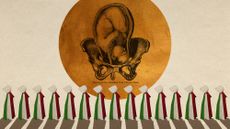Someone owes Bill McKibben an apology over the Keystone pipeline
A new study shows that Jonathan Chait's crusade against anti-Keystone organizers is little more than contrarianism


Ever since Bill McKibben and his organization 350.org chose the Keystone XL pipeline as a rallying point for their anti-climate change movement, a few persistent critics, led by New York's Jonathan Chait, have questioned McKibben's political acumen. Given the undeniable fact that EPA regulations on coal-fired power plants will have a far greater effect on overall carbon emissions than Keystone XL, aren't McKibben and company wasting their time on a side issue?
A key piece of support for this argument was a State Department estimate that the pipeline would have a negligible effect on total carbon emissions, because the oil would simply be shipped by rail. This gave credence to the Chait view, since it implied that McKibben hadn't just picked a less-than-ideal issue as a stand-in for climate change as a whole, but was spending a whole lot of time and energy on an initiative that would literally have almost no impact on climate change.
However, a new study has re-examined the issue and come to a sharply different conclusion. Finding that the State Department analysis didn't consider the effect the pipeline might have on the world oil market, it quadruples state's high-end estimate of what effect Keystone XL might have on carbon emissions, from 27 million tons of additional carbon dioxide per year to 110 million tons.
Subscribe to The Week
Escape your echo chamber. Get the facts behind the news, plus analysis from multiple perspectives.

Sign up for The Week's Free Newsletters
From our morning news briefing to a weekly Good News Newsletter, get the best of The Week delivered directly to your inbox.
From our morning news briefing to a weekly Good News Newsletter, get the best of The Week delivered directly to your inbox.
The study probably isn't the last word on the issue. But the fact that the state analysis didn't consider the global market is a pretty glaring omission. Furthermore, it has always seemed implausible that the pipeline would have no effect whatsoever on total oil consumption; supporters of Keystone have overestimated Canada's ability to transport the oil without the pipeline, which would require some significant construction on Canada's part.
Now, you could argue that 110 million tons is still not very much compared with world emissions of nearly 40 billion tons annually. But as I've argued at length, the Keystone XL fight is about the logic of political organizing, not the arid and bloodless logic of policy design. What American politics desperately needs is a mass movement to add organizational heft and energy to the formal but inch-deep commitment the center-left has shown to climate policy. Bill McKibben knows all about and supports EPA regulations, but the plain fact is that Keystone XL is a far, far better issue for mass mobilization. Without that, the long-term chance of serious climate policy is low.
As Steve Randy Waldman once wrote, "policy is a third-order pile of BS" compared with the creation and maintenance of the moral norms that underpin society.
Still, we have yet more evidence that stopping Keystone XL would, in fact, be a substantively decent move. The question now is whether Chait will acknowledge that this new study punches a big hole in his anti-McKibben case. Back when the State Department analysis came out, he jumped on it with palpable glee. So far he has not mentioned this new one, which adds some weight to my ongoing suspicion that the whole goofy controversy was nothing more than a bunch of pointless contrarianism.
Create an account with the same email registered to your subscription to unlock access.
Sign up for Today's Best Articles in your inbox
A free daily email with the biggest news stories of the day – and the best features from TheWeek.com
Ryan Cooper is a national correspondent at TheWeek.com. His work has appeared in the Washington Monthly, The New Republic, and the Washington Post.
-
 Italian senate passes law allowing anti-abortion activists into clinics
Italian senate passes law allowing anti-abortion activists into clinicsUnder The Radar Giorgia Meloni scores a political 'victory' but will it make much difference in practice?
By Chas Newkey-Burden, The Week UK Published
-
 Magazine interactive crossword - May 3, 2024
Magazine interactive crossword - May 3, 2024Puzzles and Quizzes Issue - May 3, 2024
By The Week US Published
-
 Magazine solutions - May 3, 2024
Magazine solutions - May 3, 2024Puzzles and Quizzes Issue - May 3, 2024
By The Week US Published
-
 Arizona court reinstates 1864 abortion ban
Arizona court reinstates 1864 abortion banSpeed Read The law makes all abortions illegal in the state except to save the mother's life
By Rafi Schwartz, The Week US Published
-
 Trump, billions richer, is selling Bibles
Trump, billions richer, is selling BiblesSpeed Read The former president is hawking a $60 "God Bless the USA Bible"
By Peter Weber, The Week US Published
-
 The debate about Biden's age and mental fitness
The debate about Biden's age and mental fitnessIn Depth Some critics argue Biden is too old to run again. Does the argument have merit?
By Grayson Quay Published
-
 How would a second Trump presidency affect Britain?
How would a second Trump presidency affect Britain?Today's Big Question Re-election of Republican frontrunner could threaten UK security, warns former head of secret service
By Harriet Marsden, The Week UK Published
-
 'Rwanda plan is less a deterrent and more a bluff'
'Rwanda plan is less a deterrent and more a bluff'Instant Opinion Opinion, comment and editorials of the day
By The Week UK Published
-
 Henry Kissinger dies aged 100: a complicated legacy?
Henry Kissinger dies aged 100: a complicated legacy?Talking Point Top US diplomat and Nobel Peace Prize winner remembered as both foreign policy genius and war criminal
By Harriet Marsden, The Week UK Last updated
-
 Trump’s rhetoric: a shift to 'straight-up Nazi talk'
Trump’s rhetoric: a shift to 'straight-up Nazi talk'Why everyone's talking about Would-be president's sinister language is backed by an incendiary policy agenda, say commentators
By The Week UK Published
-
 More covfefe: is the world ready for a second Donald Trump presidency?
More covfefe: is the world ready for a second Donald Trump presidency?Today's Big Question Republican's re-election would be a 'nightmare' scenario for Europe, Ukraine and the West
By Sorcha Bradley, The Week UK Published